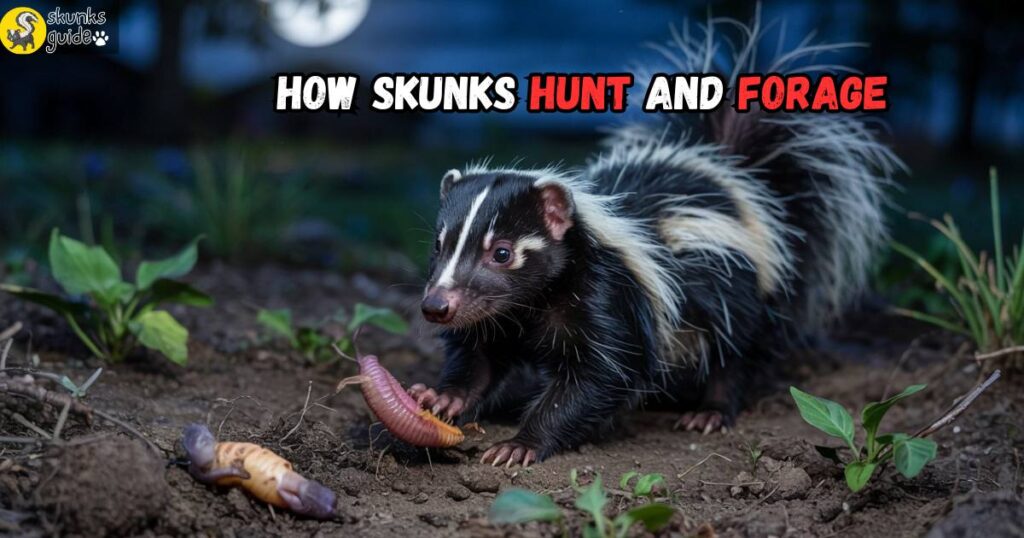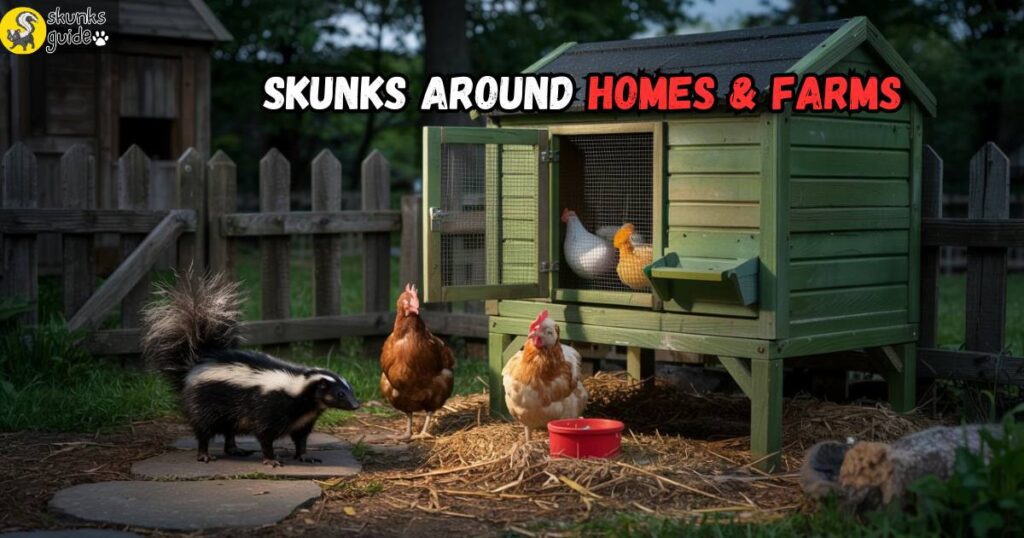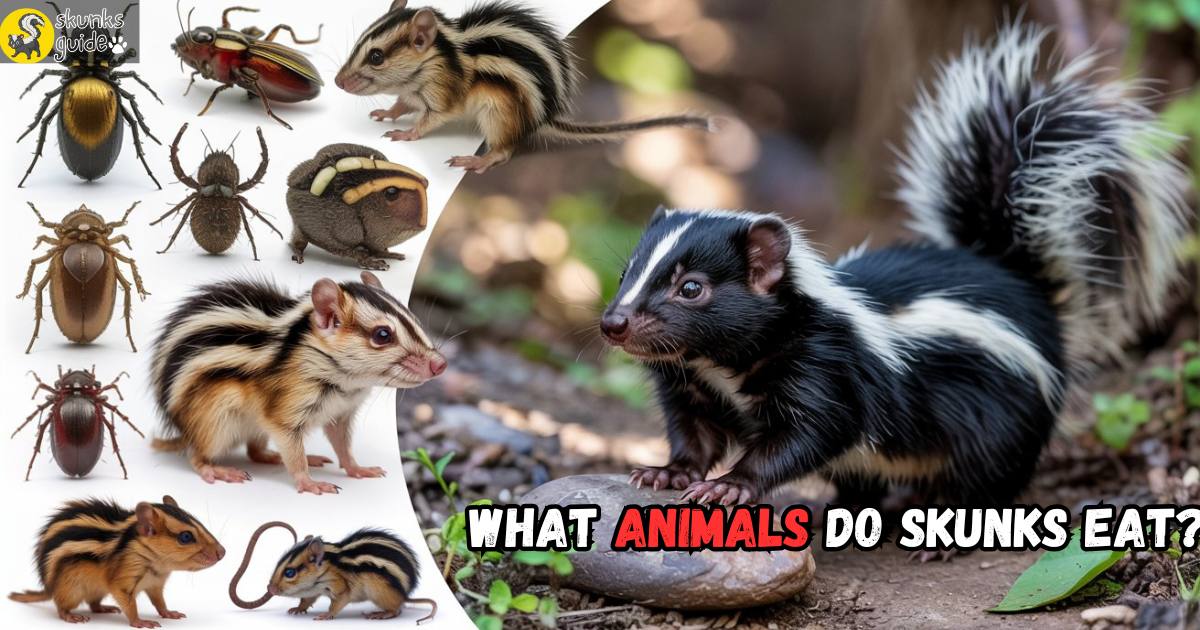What Animals Do Skunks Eat?
Last updated on June 25th, 2025 at 11:15 pm
Yes, skunks eat animals—but only small ones they can catch or scavenge. These include insects, mice, frogs, bird eggs, and even snakes. Skunks are not aggressive predators, but they are opportunistic eaters that take advantage of whatever food is easily available.
As someone who owns four pet skunks, I’ve seen how curious and adaptable they are with their diet. In the wild, this flexibility helps them survive in changing environments and makes them useful for natural pest control. In this article, I’ll explain what kinds of animals skunks eat, how they hunt or scavenge, and what that means for people who live near them—or care for them like I do.
Do Skunks Eat Animals?
Yes, skunks do eat animals—especially small or easy-to-catch prey. While not aggressive hunters, skunks are opportunistic omnivores, meaning they’ll eat whatever is accessible, including dead animals (carrion), small mammals, amphibians, and insects.
Common Animal Prey in a Skunk’s Diet
| Animal Type | Examples | Notes |
|---|---|---|
| Dead Animals | Roadkill, leftover prey | Easy meals requiring no hunting effort |
| Insects | Beetles, grubs, crickets, caterpillars | High-protein, especially common in spring & summer |
| Small Mammals | Mice, voles, shrews, baby rabbits | Often caught near fields or homes |
| Birds & Eggs | Ground-nesting birds, chicken eggs | Eggs are a favorite; skunks may raid coops |
| Reptiles & Amphibians | Frogs, toads, lizards, snakes | Skunks can resist venom from some snakes like rattlesnakes |
| Carrion | Decomposing animals | Vital survival food during winter or lean months |
How Skunks Hunt and Forage

Skunks primarily rely on their keen sense of smell to locate prey. They are nocturnal, meaning they forage and hunt under the cover of darkness.
Hunting Behaviors
- Digging: Use sharp claws to unearth grubs, insects, or burrowing animals like voles.
- Stalking: Approach small mammals or birds stealthily before striking.
- Scavenging: Explore trash, carrion, or leftovers from other predators.
Foraging Patterns
- During warm months, skunks focus on insects and small animals.
- In colder months, they scavenge more and rely on stored body fat due to reduced food availability.
Types of Skunks & Their Preferences
| Skunk Species | Animal Diet Preferences |
|---|---|
| Striped Skunk | Generalist—eats insects, rodents, fruits, and eggs |
| Spotted Skunk | More carnivorous—focuses on birds, eggs, and small mammals |
| Hog-nosed Skunk | Digs for insects and scavenges carrion |
| Hooded Skunk | Known to raid trash; eats dead animals and insects |
Skunks Around Homes & Farms

Skunks and Domestic Animals
- Chicken Coops: Vulnerable to skunk raids (especially for eggs or chicks).
- Pet Food: Leaving food outdoors attracts foraging skunks.
- Rodent Control: Skunks help reduce mice and rat populations around homes.
How to Prevent Conflicts
| Problem | Solution |
|---|---|
| Trash raids | Lock and secure garbage bins |
| Chicken coop attacks | Reinforce coops and remove eggs frequently |
| Night foraging near pets | Avoid feeding pets outside and clean food residue |
Why Skunks Eating Animals Matters
Skunks are natural pest control agents. Their diet helps reduce:
- Crop-damaging insects
- Rodent infestations
- Disease vectors (e.g., ticks carried by rodents)
They even assist in seed dispersal by eating fruits and excreting seeds elsewhere.
Frequently Asked Questions
Skunks commonly eat mice, voles, shrews, frogs, insects, and bird eggs. They may also consume lizards, snakes, and carrion.
Yes, skunks can hunt venomous snakes. They are immune to certain snake venoms, enabling them to prey on rattlesnakes and other dangerous reptiles.
Skunks may raid chicken coops to eat eggs and, occasionally, chicks. Proper coop reinforcement can prevent this behavior.
Conclusion
Skunks are opportunistic omnivores with a diet that includes a variety of small animals, making them effective pest controllers and integral components of their ecosystems. While their predatory habits are not aggressive, their ability to consume insects, rodents, and even venomous snakes highlights their adaptability and resilience. Understanding their dietary behaviors allows for better coexistence with these fascinating creatures.

